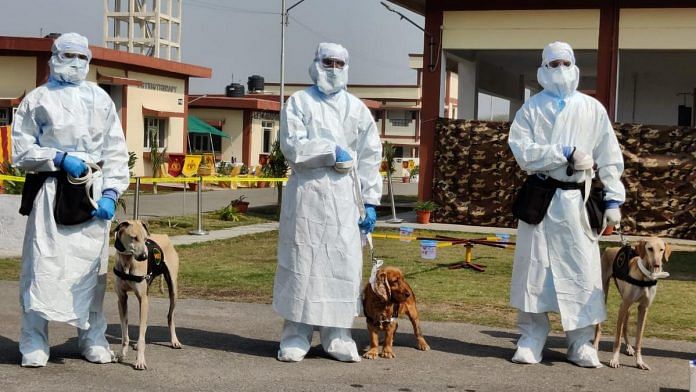New Delhi: Jaya, Casper and Mani are among India’s first military dogs to assist the country’s Covid-19 frontline team. The dogs are being trained to detect coronavirus on the basis of urine and sweat samples of individuals.
While Casper is a cocker spaniel, Jaya and Mani belong to the indigenous chippiparai breed from Tamil Nadu that have lean bodies and long legs.
The dogs are being trained on specific biomarkers emanating from urine and sweat samples of Covid-19 positive patients. The Indian Army said Jaya and Casper have been fully trained and Mani is still undergoing training. The two trained canines (Jaya and Casper) were deployed at a transit camp in Delhi where they screened 806 transient samples, of which 18 were detected as Covid-19 positive.
In a live demonstration Monday, the dogs were seen sitting quietly beside the samples that were detected positive for coronavirus.
Seven more dogs are currently being trained by the Army. On completion of training, all dogs will be deployed at transient camps to screen troops moving towards forward areas.
The Army also said it has trained its canines by taking a leaf out of global trends to use medical detection dogs for diseases such as cancer, malaria and Parkinson’s.
“It has been inferred that Covid-19 volatile metabolic biomarkers are within the threshold limit of olfactory detection capability of trained dog (sic) and can help in quick and real time detection of disease,” the statement read.
“Worldwide medical detection dogs are in vogue. Many countries use dogs for the detection of diseases like cancer, malaria, diabetes etc. The research is ongoing and they can help in real time detection of any disease, wherever there’s a metabolic biomarker and we can imprint the dog on it, we can get excellent results,” Lt Colonel Surinder Saini, instructor at the RVC Center in Meerut, told ThePrint.
Saini also said the samples are safe since these don’t carry the virus but its biomarkers that only have characteristics or fingerprints of the disease. He explained, “Whenever any tissue gets infected by a pathogen it releases a volatile metabolic biomarker, which are signatures, characteristics or fingerprints of the disease. Here, the olfactory equity is also more.”
Several countries such as France, Germany, the UAE, UK, Russia, Finland, Lebanon, Australia, Argentina, Belgium and Chile have also started training dogs for Covid-19 detection, especially to screen passengers at airports and railway stations.
Also read: Army to get Belgian Malinois, dog breed that helped in Osama raid, chased ISIS chief
How the dogs were trained
The Indian Army’s statement also said that it undertook trials for Covid-19 detection by military dogs in controlled conditions. Positive and suspected samples were obtained from the Military Hospital in Meerut Cantonment and the Netaji Subhash Chandra Bose Subharti Medical College, Meerut.
The force also noted that it had made a “concerted” effort to train an indigenous breed — the chippiparai — under Prime Minister’s Atmanirbhar Bharat initiative. Other than that, cocker spaniels and labradors are also being trained.
“Olfactory senses of dogs are good in general. While the ability of cocker spaniels and labradors are already tried and tested, we wanted to test the indigenous chippiparai and are extremely happy with the results,” Saini said.
The sensitivity and specificity of cocker spaniels and chippiparais to urine and sweat samples was found to be very high in the initial trial, where 279 urine and 267 sweat samples were used.
While the chippiparai has been trained to sniff urine samples, cocker spaniels are being trained on sweat samples, though there’s no specific reason for this distinction.
“The success rate is extremely good, at 95 per cent, for both dogs,” Saini added.
Also read: Meet Galwan, Rezang, Daulat, ITBP’s K9 warrior pups named after strategic locations along LAC




After my Parkinson’s Disease diagnosis, my primary care provider introduced me to Mayaka Natural Clinic and their PD Formula protocol, the herbal treatment has made a tremendous difference for me. My symptoms including numbness and muscle weakness all disappeared after the treatment plan! Their website is w w w. mayakanaturalclinic. c o m